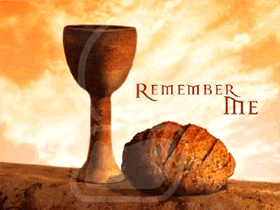This was originally written as a discussion board post for my seminary class. It is a review of Martin Luther’s Table Talk, focusing specifically on his thoughts about The Lord’s Supper.
Click here to read Luther’s Table Talk.
As I read through Martin Luther’s Table Talks on the Lord’s Supper, I can’t imagine what it must have been like to be sitting around that table listening to him share his thoughts on Christianity and particularly the sacrament of communion. What an amazing experience that must have been!
Several weeks ago I sat in on a creative planning meeting with the pastors of my church. We are a fairly young church plant and after almost a year in existence, we wanted to share the Lord’s Supper with our church family. We spent a lot of time talking about what that traditional sacrament would look like in our ultra-non-traditional church setting. We went back and forth about intinction versus the standard passing the elements up and down the rows. Once we decided on intinction, then there was the spirited conversation about how everyone should proceed to the front and how that would work based on the auditorium where our church was meeting at the time. However, there was not ever a question about the point of the sacrament or the people who would be administering the sacrament.
One of my favorite things about Martin Luther has always been the fact that he asks great questions. Sometimes you get the feeling that he would be willing to argue a point even if he didn’t believe in it, just to have something argue about! He was an incredibly intelligent theological mind who spent his time exploring the questions of the common man. I believe that Luther viewed himself as the voice of the people in his time. He was known for questioning the establishment in religion.
In Luther’s Table Talks, he spent a great deal of time questioning the leadership of the church, particularly the role of an apostle versus that of a bishop. Luther talked explicitly about the role of apostle being a call from God whereas the role of a bishop is a man-driven selection. He makes the point that the role of an apostle doesn’t have the competition found amongst those in the ranks of bishop.
Much has been written about transubstantiation and consubstantiation concerning the Lord’s Supper. Transubstantiation is the Roman Catholic perspective that the whole substance of the bread and the wine changes into the substance of the body and blood of Christ when presented in Communion. Consubstantiation holds that during the sacrament the fundamental substance of the body and blood of Christ are present alongside the substance of the bread and wine, which remain present.
Luther subscribes to the doctrine of consubstantiation. He speaks specifically to the fact that many people get lost in the worship of the elements of the Lord’s Supper rather than worshipping the Lord himself. That’s pretty interesting when you consider the point of the supper is to remember the sacrifice made on our behalf for the forgiveness of our sins.
Luther strikes me as someone that is always going to get the last word. As his parting shot in the section of his Table Talks about the Lord’s Supper, he compared the priests to Judas. People have all sorts of mixed feelings about Luther and his contributions to theology. However, you can’t dispute the fact that he had some strong beliefs and was willing to make them known to whoever would listen.
This piece is a great reminder for all of us to stop and consider the reason we do some of the things we do in worship. Why do we bow our heads when we pray? If we stand when we sing, why do we do that? Is it important to use Scripture in every message? How do we minister to those that are different than we are? Luther challenges some longstanding practices in such a way that calls all of us to ask why we celebrate the Lord’s Supper the way we do.
I Corinthians 11:23-24
23For I received from the Lord what I also passed on to you: The Lord Jesus, on the night he was betrayed, took bread, 24and when he had given thanks, he broke it and said, “This is my body, which is for you; do this in remembrance of me.” 25In the same way, after supper he took the cup, saying, “This cup is the new covenant in my blood; do this, whenever you drink it, in remembrance of me.” 26For whenever you eat this bread and drink this cup, you proclaim the Lord’s death until he comes.
27Therefore, whoever eats the bread or drinks the cup of the Lord in an unworthy manner will be guilty of sinning against the body and blood of the Lord. 28A man ought to examine himself before he eats of the bread and drinks of the cup. 29For anyone who eats and drinks without recognizing the body of the Lord eats and drinks judgment on himself. 30That is why many among you are weak and sick, and a number of you have fallen asleep. 31But if we judged ourselves, we would not come under judgment. 32When we are judged by the Lord, we are being disciplined so that we will not be condemned with the world.
